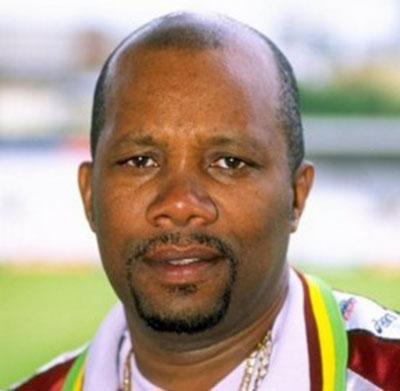BRIDGETOWN, Barbados, CMC – Legendary West Indies captain Clive Lloyd has recalled one of the “greatest and most courageous acts” he ever witnessed during his playing career, in paying tribute to ace fast bowler Malcolm Marshall on the 20th anniversary of his death.
Marshall, considered by many as the greatest fast bowler ever, died on November 4, 1999 at age 41 after battling cancer.
In the summer of 1984 on the famous tour of England, Marshall sustained a double fracture to the left thumb during the third Test at Headingley and under normal circumstances, would have been ruled out of the match.
But after applying a protective plaster, he batted in West Indies’ first innings of 302 – helping Larry Gomes to reach his hundred – and then returned to take seven for 53 in England second innings, as the Caribbean side stormed to an eight-wicket win.
“Malcolm was a special cricketer … actually I would have to say he was an ‘extra-special cricketer’,” said Lloyd, who oversaw the capture of the first two World Cups in England.
“He got his wickets with three other great fast bowlers alongside him, so in many ways the wickets were ‘shared’ yet he ended with a remarkable record as a bowler.
“The performance with a broken hand was one of the most remarkable things I have ever seen a cricketer do, certainly one of the most memorable things in my time around the game.
“The one thing I remembered most was everyone said he couldn’t play and we would be depleted. I was sitting with him and asked ‘you think you can play?’. He replied: ‘Skip, if you want me to play I will play’.”
Marshall arrived at the crease with Gomes on 96 and defied England’s bowlers for nearly 20 minutes, batting one-handed.
Even more amazing was the bowling effort to follow, scything through the England second innings to send the hosts crashing for 159.
“It was one of his best bowling performances. Normally, with such an injury guys would be expected to miss a match,” Lloyd pointed out. “He was there with the bat … he stayed at the crease and helped Larry Gomes to a hundred. Those are special things you remember… the togetherness and commitment and how they would do anything for West Indies.
“I had a lot of time for Malcolm, he wore his heart on the sleeve and West Indies cricket was first and foremost. He must rank very close to the top of all time. He was a master tactician, he could read the game very well, he was a great thinker and that’s why he was also a great coach.”
Mar¬shall was the first West Indies fast bowlers to take 300 Test wickets and ended with 376 at 20.9 each. Overall, Marshall snared an extraordinary 1651 wick¬ets at an av¬er¬age of 19, in 408 first-class match¬es.
Following his death, the southern end at Kensington Oval in his homeland Barbados was named the “Malcolm Marshall End” in his honour while the driveway to the Hampshire Bowl ground in England was renamed “Marshall Way”.






